Last updated: November 8, 2022
Article
Remembering the “Date Which Will Live In Infamy”: The Poems of Lt. Henry Lee

80 years ago, war made its way to American soil with the Japanese attack on Pearl Harbor, bringing the United States into the Second World War. The reaction of many to this was strong and visceral. Lt. Henry Lee, a twenty-seven-year-old officer serving in the Philippines, penned his own thoughts in poetic verse. His poem reminds us that the events of Pearl Harbor left no American untouched—each had his or her own reaction to the shocking news and what it portended for themselves and for the nation at large.
While it is unlikely they ever met, Lee and Dwight Eisenhower ever met, they certainly had a connection. Ike, too, had served in the Philippines. From 1935 to 1939, while working on the staff of General Douglas MacArthur, then Lieutenant Colonel Eisenhower learned crucial lessons about the Philippines and the Pacific region, information that became extremely vital to the burgeoning U.S. war effort in December 1941. In the days after Pearl Harbor, Eisenhower was called to Washington to help formulate a U.S. response. The events of Pearl Harbor dramatically altered Eisenhower’s life, as they did for Henry Lee.
From Pasadena, California, Lee was an amateur versifier who wrote regularly into a journal about life, beauty, and various topics. Following his arrival in the Philippines in late 1940, Lee was originally assigned to the 12th MP Company of the 31st Infantry. In the wake of the Pearl Harbor attack on December 7th, 1941, Lee realized he was about to be plunged into the thick of mortal combat with the nearby Japanese forces. A day afterward, far away from country and family, Lee contemplated his circumstances through the comfort of his verse, and penned the following:
“Prayer Before Battle (To Mars)”
(December 8, 1941)
Before thine ancient altar, God of War,
Forlorn, afraid, alone, I kneel to pray.
The gentle shepherd whom I would adore,
Faced by thy blazing plaything, slips away.
And I am drained of faith — alone — alone.
Who now needs faith to face thy outthrust sword,
Bereft of hope, turned pagan to the bone.
I kneel to thee and hail thee as my Lord.
From such a God as thee, I ask not life,
My life is forfeited, the hour is late.
Thou need not swerve the bullet, dull the knife.
I ask but strength to ride the wave of fate.
And one thing more — to validate this strife,
And my own sacrifice — teach me to hate.
Later a survivor of the Bataan Death March, Lt. Lee became a prisoner at the Cabanatuan POW Camp. Although now a captive, Lee continued to surreptitiously write, until liberating forces moved closer, when Japanese removed him from the Philippines, packing Lee and other prisoners onto “hell-ships,” (unmarked Japanese freighters, subject to American air power) for transport to Japan. Prior to departing, Lee buried his poems, hoping to retrieve them someday. He never made it. His first vessel was sunk, and the survivors transferred to yet another, the Enoura Maru, which was sunk in the straits of Formosa in early 1945, on January 9th. During this action, Lt. Lee was killed, and he was buried there in an unmarked grave.
Upon reoccupation of the Philippines, Henry’s book of buried poems was rediscovered, and returned to his parents. As a memorial to him, they had a limited printing of it produced in 1948. Entitled “Nothing But Praise,” it received new life in 1985 with another limited reprint to commemorate the 40th anniversary of WWII victory in the Philippines; a work that seriously cries out for republication, both on its historical, as well as its literary merits. Now, as we live through the final review of Lt. Lee’s Generation, perhaps we should finally pay heed to the wish, once here so eloquently expressed, yet so seemingly ignored, that dead of this sort “shall not have died in vain.” Beyond our own prayers, the best we might offer is nothing – but that praise.
